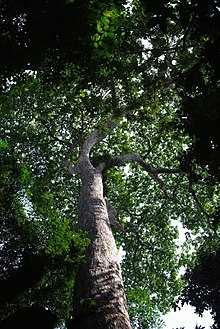Amphimas
| Amphimas | |
|---|---|

| |
| Scientific classification | |
| Kingdom: | Plantae
|
| (unranked): | Angiosperms
|
| (unranked): | |
| (unranked): | |
| Order: | |
| Family: | |
| Subfamily: | |
| (unranked): | |
| Genus: | Amphimas Pierre ex Harms
|
| Species[2][3][4] | |
| |
Amphimas is a small genus of flowering plants in the legume family, Fabaceae. It belongs to the subfamily Faboideae. It is a west African tree used for medicine and for wood.[5] Amphimas was traditionally assigned to the tribe Sophoreae;[6] however, recent molecular phylogenetic analyses reassigned Amphimas into an unspecified position in the Meso-Papilionoideae.[7][1]
References[]
- ^ a b Cardoso D, Pennington RT, de Queiroz LP, Boatwright JS, Van Wyk B-E, Wojciechowskie MF, Lavin M (2013). "Reconstructing the deep-branching relationships of the papilionoid legumes". S Afr J Bot. 89: 58–75. doi:10.1016/j.sajb.2013.05.001.
- ^ "ILDIS LegumeWeb entry for Amphimas". International Legume Database & Information Service. Cardiff School of Computer Science & Informatics. Retrieved 3 November 2016.
- ^ USDA; ARS; National Genetic Resources Program. "GRIN species records of Amphimas". Germplasm Resources Information Network—(GRIN) [Online Database]. National Germplasm Resources Laboratory, Beltsville, Maryland. Retrieved 3 November 2016.
- ^ "The Plant List entry for Amphimas". The Plant List. Royal Botanic Gardens, Kew and the Missouri Botanical Garden. 2013. Retrieved 3 November 2016.
- ^ "Amphimas". Legumes of the World. Kew Royal Botanic Gardens. Archived from the original on November 4, 2016. Retrieved November 3, 2016.
- ^ Polhill RM (1981). "Sophoreae". In Polhill RM, Raven PH (eds.). Advances in Legume Systematics, Part 1. Royal Botanic Gardens, Kew. pp. 213–230. ISBN 9780855212247.
- ^ Cardoso D, de Queiroz LP, Pennington RT, de Lima HC, Fonty É, Wojciechowski MF, Lavin M (2012). "Revisiting the phylogeny of papilionoid legumes: New insights from comprehensively sampled early-branching lineages". Am J Bot. 99 (12): 1991–2013. doi:10.3732/ajb.1200380. PMID 23221500.
| Wikispecies has information related to Amphimas. |
Categories:
- Faboideae
- Fabaceae genera
- Faboideae stubs